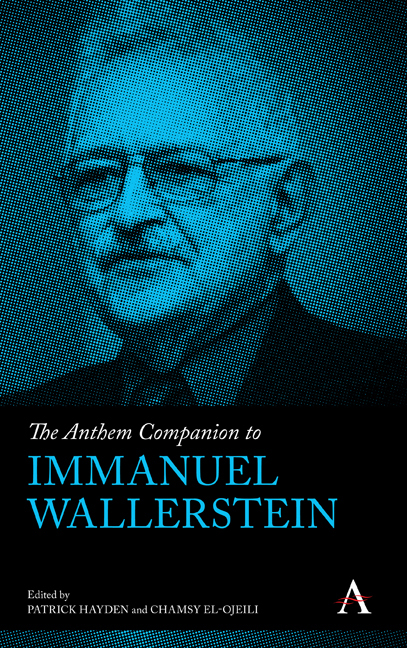Book contents
- Frontmatter
- Contents
- Notes on Contributors
- Acknowledgments
- Chapter 1 “There Is No Such Thing as Sociology”: Wallerstein as Sociologist
- Chapter 2 From Africa to the World: The Sources of Wallerstein’s The Modern World-System
- Chapter 3 Immanuel Wallerstein, World-Systems Analysis and the Structures of Knowledge
- Chapter 4 Wallerstein as International Political Sociologist: On Power, Hegemony and the Interstate System
- Chapter 5 The Agonies of Liberalism: Wallerstein on the Rise and Fall of Liberal Ideology
- Chapter 6 Global Inequalities Avant la Lettre: Theoretical Filiations and Radical Critique
- Chapter 7 Reckoning with Gender in the World-System: Insights from and Challenges to Wallerstein
- Chapter 8 The Past and Future of Antisystemic Movements: Possibilities and Limits of Social Change in Wallerstein’s World-Systems Analysis
- Chapter 9 The Global Environment and Climate Change inthe Modern World-System
- Chapter 10 Pervasive Pandemics: Understanding Global Healthand Disease from a World-Systems Perspective
- Index
Chapter 2 - From Africa to the World: The Sources of Wallerstein’s The Modern World-System
Published online by Cambridge University Press: 29 February 2024
- Frontmatter
- Contents
- Notes on Contributors
- Acknowledgments
- Chapter 1 “There Is No Such Thing as Sociology”: Wallerstein as Sociologist
- Chapter 2 From Africa to the World: The Sources of Wallerstein’s The Modern World-System
- Chapter 3 Immanuel Wallerstein, World-Systems Analysis and the Structures of Knowledge
- Chapter 4 Wallerstein as International Political Sociologist: On Power, Hegemony and the Interstate System
- Chapter 5 The Agonies of Liberalism: Wallerstein on the Rise and Fall of Liberal Ideology
- Chapter 6 Global Inequalities Avant la Lettre: Theoretical Filiations and Radical Critique
- Chapter 7 Reckoning with Gender in the World-System: Insights from and Challenges to Wallerstein
- Chapter 8 The Past and Future of Antisystemic Movements: Possibilities and Limits of Social Change in Wallerstein’s World-Systems Analysis
- Chapter 9 The Global Environment and Climate Change inthe Modern World-System
- Chapter 10 Pervasive Pandemics: Understanding Global Healthand Disease from a World-Systems Perspective
- Index
Summary
Introduction
According to Immanuel Wallerstein, his most celebrated book almost did not make it into print. It was finally Charles Tilly who showed confidence in The Modern World-System I: Capitalist Agriculture and the Origins of the European World-Economy in the Sixteenth Century (1974a). Wallerstein had a similar experience with the book's companion article from the same year, “The Rise and Future Demise of the World Capitalist System: Concepts for Comparative Analysis” (1974b). Before it appeared in the pages of Comparative Studies in Society and History, the American Journal of Sociology passed on publication. Its editor described the work as having “many flaws.” Of the two reviewers, the first found it “rambling” and a “diatribe,” commenting “I do not find this paper novel.” The second reviewer was slightly kinder but remained unimpressed. Given Wallerstein's attention to “Marx and the ‘debates’ of the great Marxists on major issues regarding the nature and dynamics of capitalism,” this reviewer concluded that the leading sociology journal was not a “suitable” venue for publication (Bidwell 1973).
A half-century later, it is remarkable that the first fully formed expositions of world-systems analysis (WSA) initially struggled to make it into print. In retrospect, opposition from fellow sociologists was predictable, given that Wallerstein was, as he put it, a “heretic” within social science at the time (2000, xi). It was not merely that he challenged the field's conclusions. It was that he opposed its worldview, which he regarded as perpetuating inequality and political violence. Indeed, The Modern World-System inaugurated a new way of thinking about social science.
The notion of a world-system came only after nearly two decades of frustration with, and attempts to amend, popular models of national development. Africa confounded social scientific expectations. Ultimately, Wallerstein concluded that development was a relational process involving powerful core nations, the intermediate semiperiphery and the marginalized periphery. Wallerstein came to this view through his personal experiences, contemporary politics and the works of influential thinkers. This study presents a dialectic—thesis, antithesis, synthesis—on the beginnings of WSA. It argues that the world-systems tradition is both an important correction to conventional interpretations of development and a tool for liberation today.
- Type
- Chapter
- Information
- The Anthem Companion to Immanuel Wallerstein , pp. 15 - 36Publisher: Anthem PressPrint publication year: 2023



